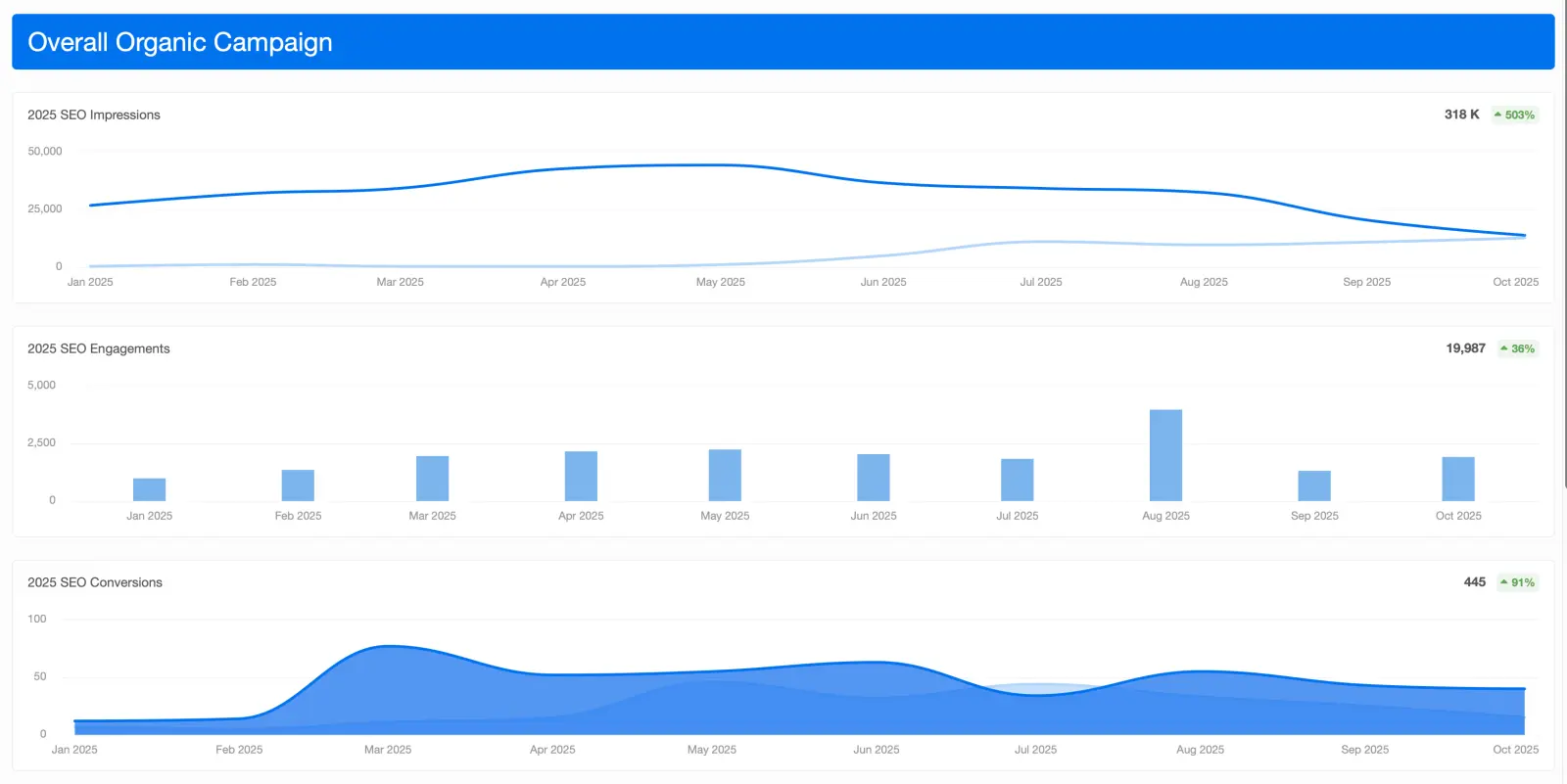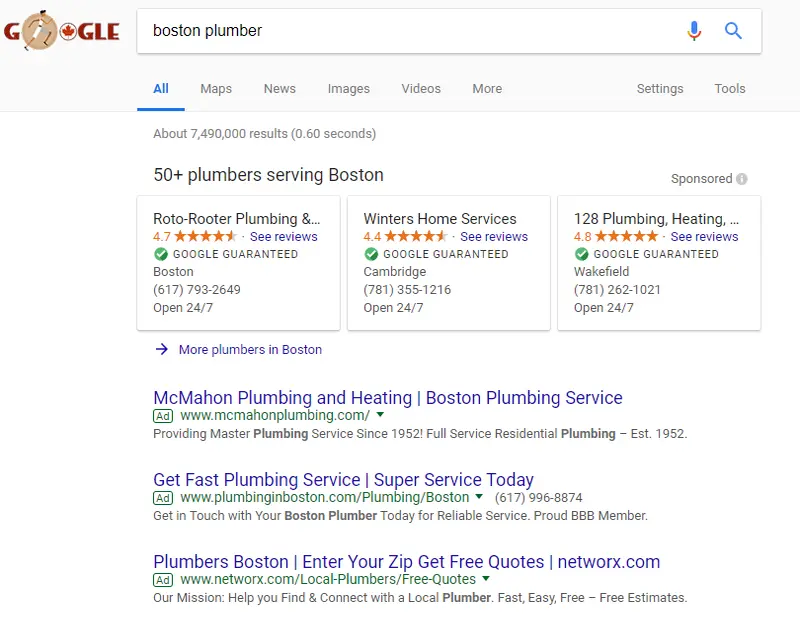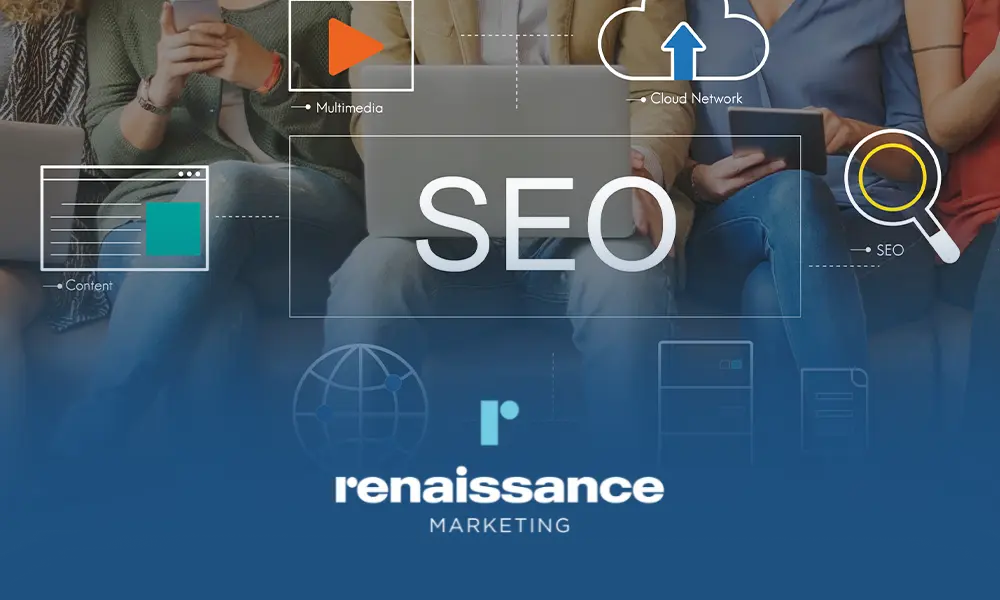- What is SEO, and How Do Search Engines Work?
- What is an Organic Search Ranking?
- 4 Reasons Why SEO is Important for Businesses
- How Does SEO Work?
- Website Crawling and Indexing
- Improving Your Web Page Rankings on a SERP
- Why Use SEO Services Instead of Doing SEO Yourself?
- What SEO Services are Available?
- When to Use SEO vs. PPC
- FAQs About SEO Services
If you’ve ever wondered why some businesses appear at the top of Google search results while others remain buried on page ten, the answer often comes down to one thing: search engine optimization.
But what are SEO services exactly, and how can they transform your business’s online presence?
SEO services encompass a range of strategies and tactics designed to improve your website’s visibility in search engine results. When done right, SEO connects your business with people actively searching for what you offer—at the exact moment they need it.
What is SEO, and How Do Search Engines Work?
SEO stands for Search Engine Optimization. It’s the practice of optimizing your website and online presence to rank higher in search engine results pages (SERPs) for relevant queries. When someone searches for “plumber near me” or “best CRM software for small business,” search engines like Google use complex algorithms to determine which websites appear first.
Search engines have three primary functions. First, they crawl the web using automated bots (often called spiders or crawlers) that discover new and updated content. Second, they index this content, organizing and storing information about billions of web pages in massive databases. Finally, they rank these pages based on hundreds of factors when someone performs a search, delivering the most relevant and useful results.
Understanding this process is crucial because SEO services work within this framework. Professional SEO providers optimize your website so search engines can easily crawl it, accurately index your content, and recognize your pages as valuable, authoritative answers to user queries.
What is an Organic Search Ranking?

When you search for something on Google, you’ll notice different types of results. Some have “Sponsored” or “Ad” labels—these are paid advertisements. Below those, you’ll find organic search results, which are the unpaid listings that appear based on their relevance and authority.
Your organic search ranking refers to where your website appears in these unpaid results. Ranking on the first page of Google for relevant keywords can dramatically increase your visibility and traffic. Studies show that the first five organic results receive the majority of clicks, with positions dropping off significantly as you move down the page.
Unlike paid advertising, where you can buy your way to the top temporarily, organic rankings are earned through consistent optimization efforts. They reflect search engines’ assessment of your website’s quality, relevance, and authority. While achieving high organic rankings takes time and effort, the results are sustainable and don’t disappear the moment you stop paying.
4 Reasons Why SEO is Important for Businesses
If you’re questioning whether SEO is worth the investment, consider these compelling reasons why businesses of all sizes make it a priority.
Free and Sustainable Website Traffic
Once you achieve strong organic rankings, the traffic that flows to your website is essentially free. Unlike pay-per-click advertising, organic traffic doesn’t cost you anything beyond your initial investment in optimization.
This traffic is also sustainable. While rankings can fluctuate, a well-optimized website maintains its position over time with regular maintenance. In paid advertising, your visibility disappears the moment your budget runs out. SEO creates a long-term asset that continues delivering value month after month and year after year.
Target the Right Audience
SEO allows you to reach people with high intent—those actively searching for solutions you provide. When someone types “emergency roof repair near me” into Google, they’re not casually browsing. They have an immediate need and are ready to make a decision.
By optimizing for the right keywords, you ensure your business appears when your ideal customers are searching. This targeted approach means you’re not wasting resources trying to convince people they need what you offer. Instead, you’re connecting with people who already recognize their need and are actively seeking help.
Build Brand Authority and Trust
Ranking highly in organic search results does more than drive traffic—it builds credibility. Consumers associate top search positions with industry leadership and trustworthiness. When your business consistently appears on the first page for relevant queries, you’re silently communicating that you’re an established, authoritative player in your field.
This perceived authority extends beyond search results. Customers who discover you through organic search often have higher trust levels than those who click on paid ads. They see your organic ranking as a third-party endorsement, with Google essentially vouching for your relevance and quality.
Long-Term Benefits
SEO is an investment that compounds over time. While paid advertising stops working the moment you stop funding it, SEO efforts continue delivering results long after the initial work is complete. Content you create today can attract visitors for years to come.
Additionally, the infrastructure you build through SEO—quality content, technical optimization, earned backlinks, and brand recognition—creates a moat around your business. Competitors can’t simply outspend you to steal your rankings overnight. Your established authority and optimized presence become competitive advantages that strengthen over time.
How Does SEO Work?
Understanding what SEO services are requires grasping how the optimization process actually works. At a high level, SEO involves making your website more accessible, understandable, and valuable to both search engines and users.
The process begins with research. SEO professionals identify the keywords and phrases your target audience uses when searching for businesses like yours. This keyword research informs your entire strategy, ensuring you’re optimizing for terms that actually drive business results rather than vanity metrics.
Next comes on-page optimization. This involves optimizing individual web pages for target keywords through strategic placement in titles, headings, content, and meta tags. It also includes improving user experience elements like page speed, mobile responsiveness, and intuitive navigation.
Off-page optimization builds your website’s authority through external factors, primarily backlinks from other reputable websites. When authoritative sites link to your content, search engines interpret this as a vote of confidence in your expertise; alternatively, when disreputable sites link to you, it hurts your online reputation.
Technical SEO ensures search engines can efficiently crawl and index your website. This includes optimizing your site structure, fixing broken links, implementing proper redirects, ensuring mobile-friendliness, and addressing technical issues that might prevent search engines from accessing your content.
Content creation provides the substance that attracts both search engines and users. High-quality, relevant content that answers user questions and provides genuine value is the foundation of successful SEO.
Website Crawling and Indexing
Before your website can rank for anything, search engines need to discover it, understand it, and store information about it. This happens through crawling and indexing.
Crawling is the discovery process. Search engine bots follow links from one page to another across the internet, constantly discovering new content and checking for updates to existing content. When these bots visit your site, they analyze your content, structure, and links to understand what your pages are about.
Several factors affect how efficiently search engines crawl your site. A clear site structure with logical internal linking helps bots navigate your content easily. A properly configured robots.txt file tells search engines which pages to crawl and which to ignore. An XML sitemap provides a roadmap of all your important pages, making it easier for search engines to find everything.
After crawling, search engines index your content. Think of indexing as creating a massive library catalog where information about your pages is stored and organized. When someone performs a search, search engines don’t scan the entire internet in real-time—they search their index to find the most relevant pages.
Technical SEO services focus heavily on optimizing crawling and indexing. If search engines can’t properly crawl or index your site, even the best content won’t help you rank. Common issues include duplicate content, broken links, slow loading speeds, and improper use of canonical tags—all problems that professional SEO services identify and fix.
Improving Your Web Page Rankings on a SERP
Once your pages are indexed, the real work begins: climbing the search engine results page. Search engines use hundreds of ranking factors to determine which pages appear first for any given query.
Content quality and relevance are paramount. Your content must thoroughly address the search intent behind each query. If someone searches for “how to install a ceiling fan,” they want a detailed guide with steps—not a sales page for ceiling fans. Creating content that matches search intent is fundamental to ranking well.
On-page optimization signals help search engines understand your content’s topic and relevance. This includes strategic keyword placement in titles, headers, and throughout your content, as well as optimizing meta descriptions, image alt text, and URL structures. However, modern SEO is not about keyword stuffing—it requires naturally incorporating commonly searched terms while prioritizing readability and human connection.
Backlinks remain one of the most powerful ranking factors. When reputable websites link to your content, it signals authority and trustworthiness. However, not all backlinks are equal. Sometimes, it’s necessary to “disavow” toxic backlinks that can actually hurt your ranking.
User experience metrics increasingly influence rankings. Search engines analyze how users interact with your site: Do they immediately click back to search results, suggesting your page didn’t meet their needs? Or do they stay, engage with your content, and explore other pages? Page speed, mobile-friendliness, and intuitive navigation all contribute to positive user signals.
Local SEO factors matter for businesses serving specific geographic areas. Optimizing your Google Business Profile, earning local citations, and gathering reviews all contribute to appearing in local search results and Google’s map pack.
Why Use SEO Services Instead of Doing SEO Yourself?
Many business owners consider handling SEO in-house to save costs. While basic optimization is certainly possible for motivated and tech-savvy people, professional SEO services offer a higher ROI with less stress.
First, SEO requires specialized expertise that takes years to develop. Search engine algorithms change constantly, and staying current with best practices, algorithm updates, and emerging trends is a full-time job. SEO professionals dedicate their careers to mastering these complexities and staying up-to-date. That depth of knowledge is difficult to replicate as a business owner—or even as an in-house marketing director—juggling multiple responsibilities. Your time is usually better spent elsewhere.
Professional SEO services also bring the right tools to the job. Industry-standard SEO platforms for keyword research, competitor analysis, rank tracking, and technical audits can cost thousands of dollars annually. Agencies already invest in these tools and know how to use them effectively, providing you access to capabilities that would be prohibitively expensive to replicate independently.
Perhaps most importantly, professional services deliver results faster. While you’re learning through trial and error, competitors working with experienced agencies are pulling ahead. Professionals can identify opportunities and implement solutions efficiently, avoiding common mistakes that waste time and potentially harm your rankings.
[CTA Button] Book an Intro Meeting
What SEO Services are Available?
When businesses ask what SEO services are, they’re often surprised by the variety of specialized offerings available. Different businesses have different needs, and understanding these categories helps you choose the right approach for your situation.
Local SEO
Local SEO focuses on improving visibility for geographically related searches. If you’re a dentist in Richmond, a restaurant in Tampa, or an HVAC company serving Northern Virginia, local SEO helps you appear when people in your service area search for what you offer.
This specialized approach is essential for businesses that serve customers face-to-face or within specific geographic areas. Traditional SEO tactics alone won’t achieve the local visibility that drives foot traffic and service calls.
National SEO
National SEO targets customers across the entire country rather than specific geographic regions. This approach is ideal for e-commerce businesses, SaaS companies, national service providers, and brands that ship products nationwide.
National SEO campaigns face intense competition since you’re competing with businesses from everywhere. Success requires creating exceptional content, building a strong backlink profile from authoritative sources, and often targeting more specific long-tail keywords rather than competing for ultra-competitive head terms.
E-commerce SEO
E-commerce SEO presents unique challenges and opportunities. With hundreds or thousands of product pages, optimization requires both strategic thinking and systematic execution.
E-commerce SEO services include optimizing category pages and product descriptions, implementing proper site architecture to help search engines understand relationships between products, creating valuable content that attracts shoppers earlier in their buying journey, and addressing technical challenges like duplicate content from similar products or faceted navigation.
B2C vs. B2B SEO
While the fundamental principles remain the same, B2C and B2B SEO strategies differ significantly in execution. B2C SEO often targets high-volume keywords with shorter sales cycles. Content tends to be more accessible and emotion-driven, with optimization focused on product pages and informational content that drives quick purchasing decisions.
B2B SEO typically involves longer, more complex sales cycles. Your audience is researching extensively, often requiring approval from multiple stakeholders. B2B SEO strategies emphasize thought leadership content, detailed case studies, whitepapers, and educational resources that support buyers throughout extended decision-making processes.
SEO Audit Services
An SEO audit is a comprehensive analysis of your website’s current optimization status. Professional audits examine technical factors, on-page optimization, content quality, backlink profile, user experience, and competitive positioning.
The value of an audit lies in identifying specific opportunities and issues holding your site back. Rather than guessing why you’re not ranking, an audit provides data-driven insights about what’s working, what’s not, and what needs immediate attention.
When to Use SEO vs. PPC
SEO and pay-per-click advertising both increase visibility in search results, but they work very differently. Understanding when to use each—or both—depends on your business goals, timeline, and budget.PPC delivers immediate results. Launch a campaign today, and you’re appearing at the top of search results tomorrow. This immediacy makes PPC ideal for promotions, seasonal businesses, new product launches, or situations where you need traffic quickly. However, the visibility stops the moment you stop paying, and costs can escalate quickly for competitive keywords.

SEO takes longer to deliver results—typically three to six months before seeing significant improvements, and longer for competitive industries. However, once established, organic rankings provide sustainable, cost-effective traffic that doesn’t disappear when you stop paying. SEO also tends to build over time, with your investment compounding as authority grows.
The ideal approach for many businesses combines both strategies. Use PPC to generate immediate leads while building SEO for long-term sustainability. As your organic rankings improve, you can gradually reduce PPC spending, maintaining visibility while improving overall marketing efficiency.
Budget considerations matter too. PPC requires ongoing monthly spending that scales with your desired visibility. SEO typically involves fixed monthly service fees that don’t increase based on traffic volume. For businesses with limited budgets, SEO often provides better long-term return on investment.
FAQs About SEO Services
How do I track my SEO progress?
Tracking SEO success involves monitoring several key metrics over time. Organic traffic from tools like Google Analytics shows how many visitors find your site through search engines. Keyword rankings track your position for target search terms, helping you see movement over time. Conversion metrics reveal whether traffic translates into leads or sales, ensuring you’re not just increasing visibility but driving business results.
Quality SEO agencies provide regular reports that translate these metrics into meaningful insights. They show not just what’s happening, but why it matters and what it means for your business goals. Transparency in reporting helps you understand the value you’re receiving and makes informed decisions about continuing and expanding your SEO investment.
Can you guarantee top rankings?
No reputable SEO agency will guarantee specific rankings, and you should be skeptical of anyone who does. Search engines use proprietary algorithms with hundreds of ranking factors, and no one outside these companies knows exactly how they work. Rankings naturally fluctuate based on competitor actions, algorithm updates, and changing user behavior.
What professional SEO services can guarantee is ethical practices that follow search engine guidelines, consistent effort toward improvement, transparent reporting on progress, and strategies proven to drive results over time. They should also stand behind their work—if they’re not moving the needle after a reasonable period, they should be willing to reassess and adjust strategy.
How much should I budget for SEO?
SEO service costs vary widely based on your business size, competition level, and goals. Small local businesses might invest anywhere from $1,000 to $3,000 monthly for comprehensive services, while larger companies with national reach might spend $5,000 to $15,000 or more monthly.
One-time projects like technical audits or website upgrades typically range from $2,000 to $10,000, depending on site complexity. When evaluating costs, consider the potential return. If SEO generates even a few additional customers monthly, the revenue often significantly exceeds the investment, especially when compared to the ongoing costs of paid advertising for the same traffic volume.
When can I stop using SEO?
SEO isn’t a project you complete and forget—it’s an ongoing process. Search engine algorithms constantly evolve, competitors continuously improve their own optimization, and user behavior changes over time. Stopping SEO efforts typically results in gradual ranking declines as competitors invest in their own visibility.
Think of SEO like maintaining physical fitness. You can’t work out for six months, achieve results, then stop and expect to maintain those results indefinitely. Ongoing effort maintains and builds upon your achievements.
That said, SEO investment levels can flex over time. Once you’ve achieved strong rankings, you might shift from aggressive growth mode to maintenance mode, reducing monthly investment while preserving your position.
How long does it take for SEO services to work?
Most businesses begin seeing measurable improvements within three to six months of starting SEO services. However, significant results—like ranking on page one for competitive keywords—often take six to twelve months or longer.
Several factors influence this timeline. New websites take longer than established sites because they lack domain authority and history. Competitive industries require more time and effort than niche markets with little competition. The current state of your website matters, too; a technically broken site needs foundational fixes before pursuing aggressive optimization.
How do I choose the best SEO agency?
Selecting an SEO partner is one of the most important marketing decisions you’ll make. Start by looking for agencies with proven experience in your industry or with similar business types. Ask for case studies and references from businesses comparable to yours.
Transparency is crucial. The agency should clearly explain their strategies, provide regular detailed reports, and set realistic expectations about timelines and results.
Communication style matters, too. You want a partner who takes time to understand your business, asks questions about your goals, and presents themselves as collaborators rather than vendors. The best agency relationships feel like partnerships where both parties work toward shared success.
Finally, ensure their approach aligns with search engine guidelines. Ask specifically about their link-building methods and content creation practices. Ethical, white-hat SEO might take longer, but it builds sustainable results without risking penalties that could devastate your online presence in the future.
How long do I need to pay for SEO services?
There’s no predetermined contract length that applies to all businesses, though most SEO agencies work on monthly retainers with initial commitments of at least six months. This minimum commitment reflects the time required to implement strategies and begin seeing results.
Many successful businesses maintain SEO services for years because the continued investment compounds previous work. As your rankings improve and your authority grows, the same monthly investment delivers increasing returns.
Understanding what SEO services are and how they work empowers you to make informed decisions about your digital marketing strategy. Whether you’re just beginning to explore SEO or looking to enhance your existing efforts, the right strategy and partner can transform your online visibility and drive sustainable business growth.
See exactly how our SEO strategies have paid off for businesses in this case study.


